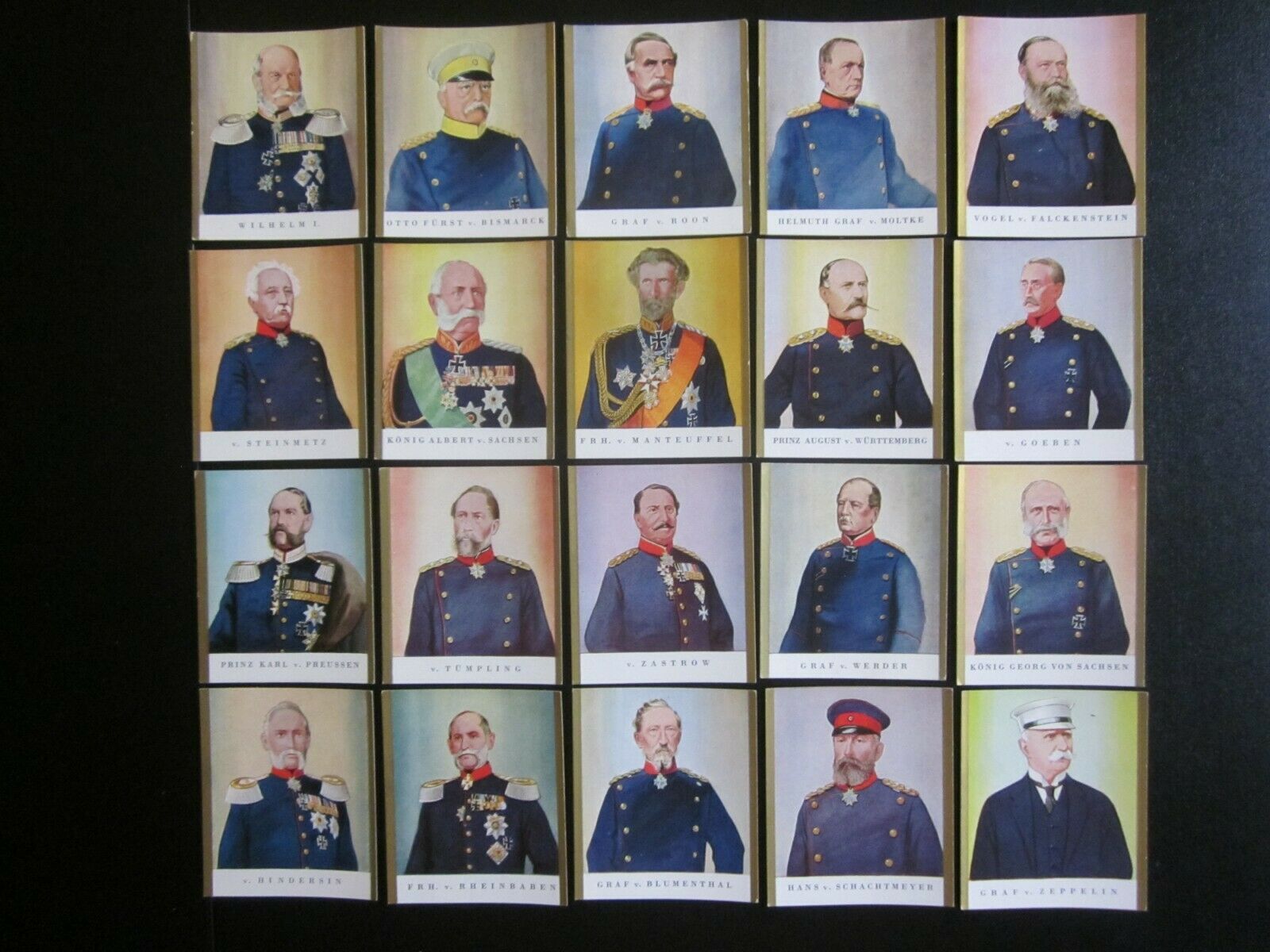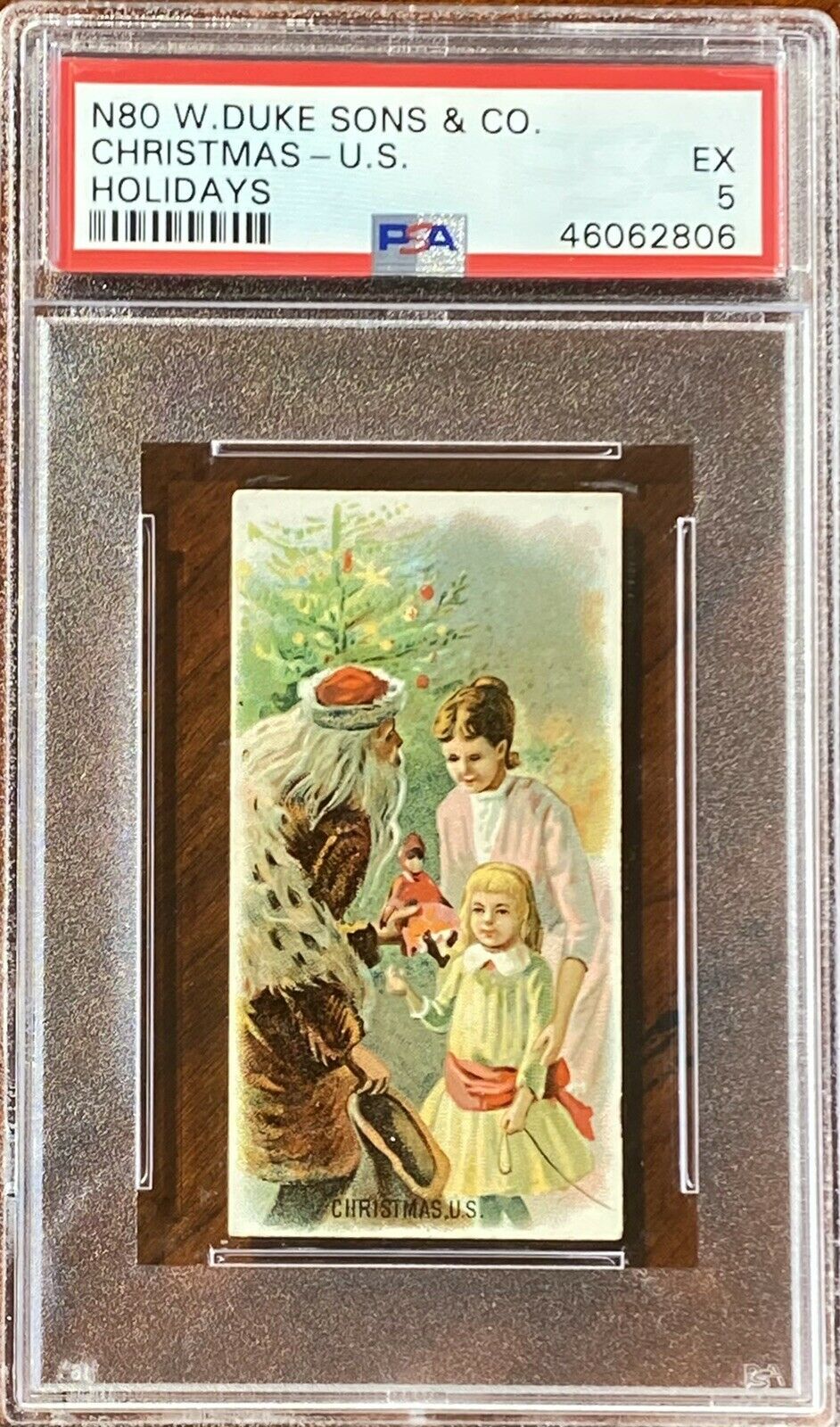-40%
20 color German cig. cards: German military leaders (1866-1871), issued 1933
$ 2.18
- Description
- Size Guide
Description
Offered here are 20 original German cigarette cards of German military leaders of the Wars of German Unification (1864-1871). The cards were issued by the Kyriazi Cigarette Co. of Hamburg in 1933 for the albumDeutsche Helden
(German Heroes). Pictured here are:
No. 97:
Wilhelm I, King of Prussia (1861-1888), Emperor of the German Empire (1871- 1888). He and his minister president, Otto von Bismarck, oversaw the unification of Germany during his reign.
No. 99:
Imperial Chancellor
Otto von Bismarck
(1815-1898). He was the German statesman who masterminded the unification of Germany through a series of wars against Denmark (1864), Austria (1866) and France (1870-71).
No. 100:
Field Marshal Count Albrecht von Roon (1803-1879) was the Prussian Minister of War between 1859 and 1873. He was a general of the infantry in the Austro-Prussian War (1866) and received the Order of the Black Eagle for his service. He was named Field Marshal in 1873 after his service in the Franco-Prussian War (1870-71).
No. 101:
Field Marshal Count Helmut von Moltke, the Elder (1800-1891), Hero of the Battle of Sedan (1870). He was the Chief of Staff of the Prussian Army for 30 years and modernized fighting strategy in the field. He commanded troops in the Prussian Wars of Unification and introduced the effective use of railways into military strategy.
No. 103:
Infantry General Vogel von Falckenstein (1839-1917). He led troops against the Danish in the Second Schleswig War and received the medal Pour le Mérité for his deeds. He later led the VII. Army Corps in the Franco-Prussian War.
No. 104:
Field Marshal Karl Friedrich von Steinmetz (1792-1877) fought as a young soldier in the Wars of Liberation against Napoleon, led troops in the Austro-Prussian War (1866) and later led one of three Prussian armies on the Rhine in the Franco-Prussian War. He was a recipient of the Iron Cross, Second Class.
No. 106:
Field Marshal Albert of Saxony (1828-1902). He was a solid ally of Prussia and led Saxon troops in the wars against Denmark, Austria and France. He led the encirclement of Sedan in the North and East in the Franco-Prussian War. In 1873 he was named King of Saxony.
No. 107:
General Field Marshal Baron Edwin von Manteuffel (1809-1885). He distinguished himself in the War against Denmark (1864) and in the Franco-Prussian War, leading the 1
st
Army to victory at Amiens. He received the medal Pour le Mérité.
No. 109:
Major General Prince August von Württemberg (1813-1885) was a Prussian General of the Cavalry and Commanding General of the Guard Corps for over 20 years. He commanded cavalry in the Austro-Prussian War and the Franco-Prussian War, and for this service was named a Knight of the Black Eagle.
No. 110:
Infantry General August Karl von Goeben (1816-1880) won the Iron Cross for his service in the Franco-Prussian War (1870-71).
No. 112:
Prince Friedrich Karl of Prussia (1828-1885) was the nephew of Emperor Wilhelm I. He commanded a Prussian Army at the Battle of Königgrätz, defeating the Austrians there in 1866. He also defeated a French Army at the Battle of Mars-la-Tour in 1870 and was instrumental in the Siege of Metz the same year.
No. 113:
Cavalry General Wilhelm von Tümpling (1809-1884). He led the VI. Army Corps in the Austro-Prussian War (1866) and in the Franco-Prussian War and received the medal Pour le Mérité.
No. 116:
Infantry General Wilhelm von Zastrow (1801-1875). He commanded the VII. Corps in the Franco-Prussian War and
distinguished himself at
Spicheren
,
Gravelotte
and the
siege of Metz
.
No. 119:
Infantry General Count August von Werder (1808-1887). He led the Third Division at the Battle of Königgrätz in the Austro-Prussian War for which he received the medal Pour le Mérité. He was later given command of the XIV. Corps in the Franco-Prussian War, winning battles at Dijon and Nuits.
No. 122:
General Field Marshal King George of Saxony (1832-1904). He served under the command of his brother Albert at the beginning of the Franco-Prussian War, but soon received command of Albert’s XII. Corps (mostly Saxon troops).
No. 124:
Infantry General Gustav Eduard von Hindersin (1804-1872). After the Danish War (1864) he reformed German artillery, advocating for a School of Gunnery and replacing smooth-bore cannons with rifled ones. The success of this plan was evident in the Franco-Prussian War, where German artillery was key in winning the war.
No. 127:
Cavalry General Baron Paul von Rheinbaben (1834-1905). He led cavalry at the Battles of Metz, Gravelotte and LeMans in the Franco-Prussian War and received the Iron Cross First Class for his service.
No. 130:
General Field Marshal Count von Blumenthal (1810-1900). His successes at the Battle of Königgrätz
(against the Austrians in 1866) and at the Battle of Wörth in 1870 (against the French)
were crowned by his command of the Siege of Paris in 1870 during which he refused to bombard the city with artillery, so as to not destroy the beautiful city.
No. 133:
Infantry General Hans von Schachtmeyer (1816-1897). He commanded an infantry division in both the Austro-Prussian War (1866) and the Franco-Prussian War (1870-71) for which he received the medal Pour le Mérité.
No. 136:
Infantry General Count Ferdinand von Zeppelin (1838-1917). Prussian General and inventor of the Zeppelin rigid airship. He was an observer with the American Army of the Potomac during the American Civil War in 1863. He served in the Austro-Prussian and Franco-Prussian Wars.
Each card measures 2 and 3/8 inches by 2 inches.
With multiple purchases, please wait for invoice for reduced shipping.










